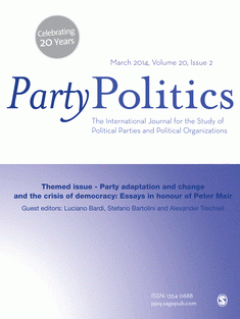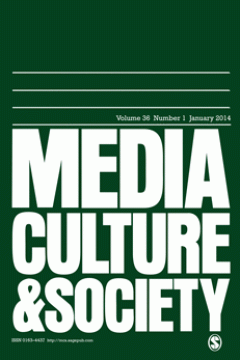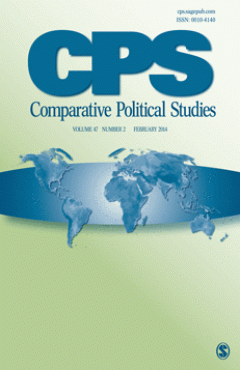Filter by

Party Politics, Volume 23, Issue 1, January 2017
- Edition
- -
- ISBN/ISSN
- 13540688
- Collation
- -
- Series Title
- -
- Call Number
- -
- Edition
- -
- ISBN/ISSN
- 13540688
- Collation
- -
- Series Title
- -
- Call Number
- -
Cooperating without Co-laboring: How Formal Organizational Power Moderates Cr…
I examine how different distributions of ownership and governance rights in firms affect the optimal organization of cross-functional project teams for knowledge-intensive work. I analyze multi-method data from two competing automated manufacturing equipment engineering firms with contrasting formal power structures, one a worker cooperative with ownership and governance rights distributed acro…
- Edition
- Volume 62, Issue 1, March 2017; pp. 179–214
- ISBN/ISSN
- 0001-8392
- Collation
- -
- Series Title
- Administrative Science Quarterly
- Call Number
- -
The Non-consensus Entrepreneur: Organizational Responses to Vital Events
- Edition
- Volume 62, Issue 1, March 2017; pp. 140–178
- ISBN/ISSN
- 0001-8392
- Collation
- -
- Series Title
- Administrative Science Quarterly
- Call Number
- -
- Edition
- Volume 62, Issue 1, March 2017; pp. 140–178
- ISBN/ISSN
- 0001-8392
- Collation
- -
- Series Title
- Administrative Science Quarterly
- Call Number
- -
Prominent but Less Productive: The Impact of Interdisciplinarity on Scientist…
Federal agencies and universities in the U.S. promote interdisciplinary research because it presumably spurs transformative, innovative science. Using data on almost 900 research-center�based scientists and their 32,000 published articles, along with a set of unpublished papers, we assess whether such research is indeed beneficial and whether costs accompany the potential benefits. Existing res…
- Edition
- Volume 62, Issue 1, March 2017; pp. 105–139
- ISBN/ISSN
- 0001-8392
- Collation
- -
- Series Title
- Administrative Science Quarterly
- Call Number
- -
The Dynamics of Political Embeddedness in China
Economic transitions in countries that move from state planning and redistribution to market exchange create business opportunities but also uncertainty, because many interdependent factors�modes of exchange, types of products, and forms of organizations�are in flux. Uncertainty is even greater when the country�s political institutions remain authoritarian because the rule of law is weak and st…
- Edition
- Volume 62, Issue 1, March 2017; pp. 67–104
- ISBN/ISSN
- 0001-8392
- Collation
- -
- Series Title
- Administrative Science Quarterly
- Call Number
- -
It’s about Time! CEOs’ Temporal Dispositions, Temporal Leadership, and Co…
How CEOs think and feel about time may have a big influence on their firms� strategies. We examine how two distinct CEO temporal dispositions�time urgency (the feeling of being chronically hurried) and pacing style (one�s pattern of effort over time in working toward deadlines)�each influence corporate entrepreneurship, a key strategic behavior. We propose that CEOs� temporal leadership�how the…
- Edition
- Volume 62, Issue 1, March 2017; pp. 31–66
- ISBN/ISSN
- 0001-8392
- Collation
- -
- Series Title
- Administrative Science Quarterly
- Call Number
- -

Journal of Public Policy, Volume 37 - Issue 1 - March 2017
- Edition
- -
- ISBN/ISSN
- 0141-814X
- Collation
- -
- Series Title
- -
- Call Number
- -
- Edition
- -
- ISBN/ISSN
- 0141-814X
- Collation
- -
- Series Title
- -
- Call Number
- -

Media Culture & Society, Volume 39, Issue 3, April 2017
- Edition
- -
- ISBN/ISSN
- 0163-4437
- Collation
- -
- Series Title
- -
- Call Number
- -
- Edition
- -
- ISBN/ISSN
- 0163-4437
- Collation
- -
- Series Title
- -
- Call Number
- -

Media Culture & Society,Volume 39, Issue 2, March 2017
- Edition
- -
- ISBN/ISSN
- 0163-4437
- Collation
- -
- Series Title
- -
- Call Number
- -
- Edition
- -
- ISBN/ISSN
- 0163-4437
- Collation
- -
- Series Title
- -
- Call Number
- -

Media Culture & Society, Volume 39, Issue 1, January 2017
- Edition
- -
- ISBN/ISSN
- 0163-4437
- Collation
- -
- Series Title
- -
- Call Number
- -
- Edition
- -
- ISBN/ISSN
- 0163-4437
- Collation
- -
- Series Title
- -
- Call Number
- -

Journal of Social Policy, Volume 46 - Issue 2 - April 2017
- Edition
- -
- ISBN/ISSN
- 0047-2794
- Collation
- -
- Series Title
- -
- Call Number
- -
- Edition
- -
- ISBN/ISSN
- 0047-2794
- Collation
- -
- Series Title
- -
- Call Number
- -

Journal of Social Policy, Volume 46 - Issue 1 - January 2017
- Edition
- -
- ISBN/ISSN
- 0047-2794
- Collation
- -
- Series Title
- -
- Call Number
- -
- Edition
- -
- ISBN/ISSN
- 0047-2794
- Collation
- -
- Series Title
- -
- Call Number
- -

Administrative Science Quarterly; Volume 62, Issue 2, June 2017
- Edition
- -
- ISBN/ISSN
- 0001-8392
- Collation
- -
- Series Title
- -
- Call Number
- -
- Edition
- -
- ISBN/ISSN
- 0001-8392
- Collation
- -
- Series Title
- -
- Call Number
- -
Administrative Science Quarterly; Volume 62, Issue 1, March 2017
- Edition
- -
- ISBN/ISSN
- 0001-8392
- Collation
- -
- Series Title
- -
- Call Number
- -
- Edition
- -
- ISBN/ISSN
- 0001-8392
- Collation
- -
- Series Title
- -
- Call Number
- -
The Elephant (or Donkey) in the Boardroom: How Board Political Ideology Affec…
We examine how directors� political ideologies, specifically the board-level average of how conservative or liberal directors are, influence boards� decisions about CEO compensation. Integrating research on corporate governance and political psychology, we theorize that conservative and liberal boards will differ in their prevailing beliefs about the appropriate amounts CEOs should be paid and,…
- Edition
- Volume 62, Issue 1, March 2017; pp. 1–30
- ISBN/ISSN
- 0001-8392
- Collation
- -
- Series Title
- Administrative Science Quarterly
- Call Number
- -

The Secret Ballot and the Market for Votes at 19th-Century British Elections
This article examines the impact of the secret ballot on the market for votes at parliamentary elections in the 19th-century United Kingdom. I use a formal model of an exchange between a candidate and a voter to predict the impact of the secret ballot on bribe prices, the marginal effect campaign spending on candidates� electoral prospects, and election turnout. I test these predictions against…
- Edition
- Volume 50, Issue 5, April 2017; pp. 594–635
- ISBN/ISSN
- 00104140
- Collation
- -
- Series Title
- Comparative Political Studies
- Call Number
- -

From Open to Secret Ballot: Vote Buying and Modernization
The secret ballot is one of the cornerstones of democracy. We contend that the historical process of modernization caused the switch from open to secret ballot with the underlying mechanism being that income growth, urbanization, and rising education standards undermined vote markets. We undertake event history studies of ballot reform in Western Europe and the U.S. states during the 19th and 2…
- Edition
- Volume 50, Issue 5, April 2017; pp. 555–593
- ISBN/ISSN
- 00104140
- Collation
- -
- Series Title
- Comparative Political Studies
- Call Number
- -

An Introduction to Special Issue: The Causes and Consequences of Secret Ballo…
This article introduces a collection of papers that explore two understudied but critical questions of enduring concern for the study of democratization. Was the secret ballot driven by the same forces that drove the rise of democracy more generally? Did the secret ballot end electoral fraud, or was its effect merely endogenous to economic modernization more generally? This article provides his…
- Edition
- Volume 50, Issue 5, April 2017; pp. 531–554
- ISBN/ISSN
- 00104140
- Collation
- -
- Series Title
- Comparative Political Studies
- Call Number
- -

Good Types in Authoritarian Elections: The Selectoral Connection in Chinese L…
A new electoral design for subnational congress elections in China allows me to investigate the informational utility of authoritarian elections. Authoritarian regimes are notoriously bad at solving the moral hazard problem in the voter�s agency relationship with politicians. Borrowing from the literature on political selection, I theorize that authoritarian elections can nonetheless solve the …
- Edition
- Volume 50, Issue 3, March 2017; pp. 362–394
- ISBN/ISSN
- 00104140
- Collation
- -
- Series Title
- Comparative Political Studies
- Call Number
- -

Consultative Authoritarianism and Its Limits
Consultative authoritarianism challenges existing conceptions of nondemocratic governance. Citizen participation channels are designed to improve policymaking and increase feelings of regime responsiveness, but how successful are these limited reforms in stemming pressure for broader change? The article develops a new theoretical lens to explain how common citizens perceive the introduction of …
- Edition
- Volume 50, Issue 3, March 2017; pp. 329–361
- ISBN/ISSN
- 00104140
- Collation
- -
- Series Title
- Comparative Political Studies
- Call Number
- -
 Computer Science, Information & General Works
Computer Science, Information & General Works  Philosophy & Psychology
Philosophy & Psychology  Religion
Religion  Social Sciences
Social Sciences  Language
Language  Pure Science
Pure Science  Applied Sciences
Applied Sciences  Art & Recreation
Art & Recreation  Literature
Literature  History & Geography
History & Geography